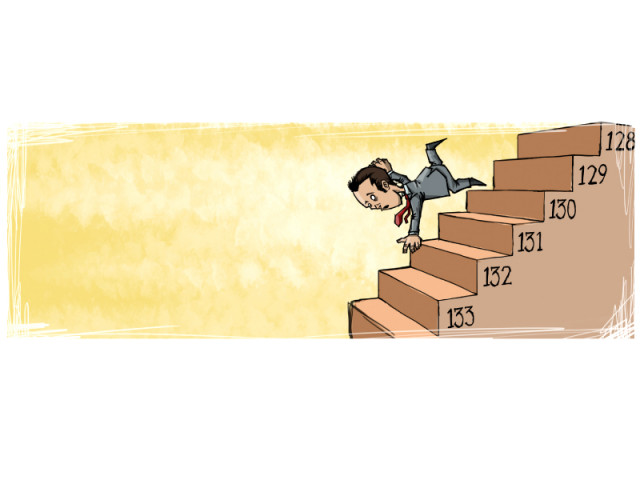Business rankings: Pakistan slips on global competitive ratings
Law and order, cost of terrorism and corruption eat away previous gains.

The deteriorating macroeconomic conditions, particularly the ministry of finance’s poor budget management pulled the country down. ILLUSTRATION: JAMAL KHURSHID
Pakistan has been clubbed among the bottom 15 nations out of 148 surveyed for competitiveness, slipping down to number 133– nine notches below last year’s ranking.
Rampant corruption, the cost of terrorism, crime and violence greatly affected the country’s global standing. The deteriorating macroeconomic conditions, particularly the ministry of finance’s poor budget management pulled the country down.
According to the Global Competiveness Index (GCI) report of 2013-14 by World Economic Forum (WEF), Pakistan was ranked at 133 out of 148 nations. Last year its position was 124. The report has included views from more than 14,000 business leaders globally to measure each country’s competitiveness. The GCI places Switzerland at the top of the ranking for the fifth year running. Singapore and Finland remained in second and third place respectively.
The gradual slipping of Pakistan’s rank shows the weakening of its institutions and the capacity of the economy to create space for innovation, said Amir Jahangir, chief executive officer of Mishal Pakistan, a partner organisation of the WEF.
Areas for public and private partnerships to improve competitiveness are also diminishing as well. Jahangir said Pakistan needs to focus on competitiveness or the economy may slide into a dangerous downward spiral.
More than 200 business leaders in Pakistan identified corruption as the most problematic factor for doing business, followed by policy instability, access to financing, inadequate supply of infrastructure, inefficient government bureaucracy and high inflation.
Pakistan has lost ground on almost all indicators. The biggest impact has been due to deteriorating law and order as a result Pakistan’s fight in the war on terror, where Pakistan ranked among the bottom 10 in the world. On business cost of terrorism the country stood at 144, business cost of crime and violence 138, and organised crime 141, among 148 countries. Pakistan showed some improvement on judicial independence.
The country showed poor performance on the government’s use of public funds, falling from 76 in 2012 to 103 in 2013. Wastefulness in government spending has also increased and the rankings have dropped from 96 last year to 116 this year. Similarly, on government regulation, Pakistan fell from 62 in 2012 to 82 in 2013, highlighting the fallouts of Statutory Regulatory Orders.
Even private businesses could not show progress, as the ranking on the efficacy of corporate boards fell to 123 in 2013 from 111 in 2012. However, equity market regulators showed some progress and the country performed well on the index for protecting minority shareholders’ interest. The overall infrastructure in the country has deteriorated from last year.
Pakistan showed improvements in tertiary education enrolment, where it moved to 121 this year from 125 in the last year. While the quality of Math and Science education dropped to 104 in 2013 from 88 in 2012, the extent of staff training has gone from bad to worst this year falling to 128.
The intensity of local competition has improved ranking from 85 to 79 this year, in addition to improving prevalence of trade barriers from 114 from 92 this year. However the country was successful in improving rules and regulations to encourage, thus improving the business impact of rules on FDI, and was ranked at 75 this year compared to 96 last year.
Pakistan showed significant gains in the technical readiness criteria with the availability of latest technologies, ranking at 79, and firm-level technology absorption ranking at 81. Pakistan also showed improvements on capacity for innovation by improving 11 points and securing regional competitiveness advantage at 49.
Pakistan’s ranking in university-industry collaboration for research and development declined from 81 to 98, making industry depend on replicating instead of creating new products and services.
Published in The Express Tribune, September 5th, 2013.
Like Business on Facebook, follow @TribuneBiz on Twitter to stay informed and join in the conversation.



















COMMENTS
Comments are moderated and generally will be posted if they are on-topic and not abusive.
For more information, please see our Comments FAQ